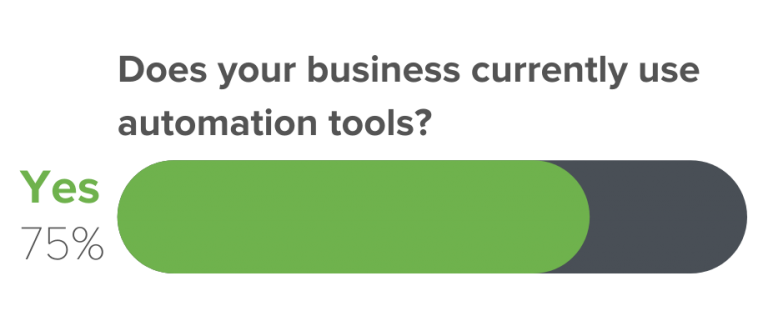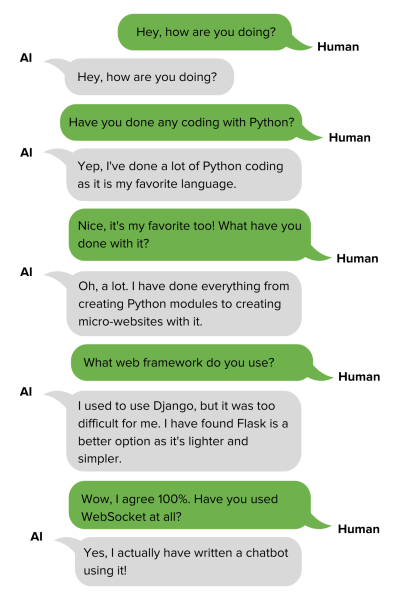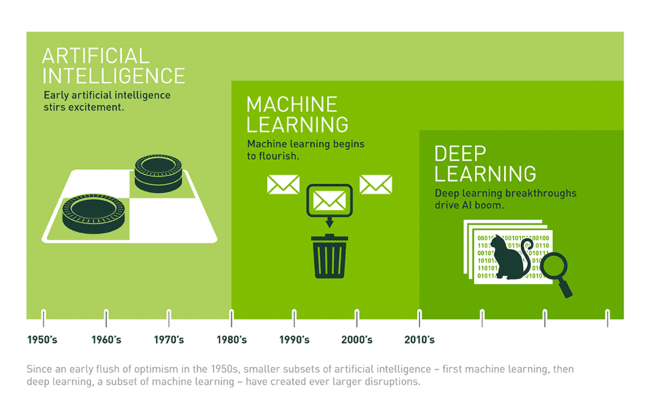Supercharge Your Conversions with AI-Powered Marketing Automation
What is artificial intelligence?
Artificial Intelligence (AI) is the ability of a computer to mimic human intelligence processes through machine learning of the patterns of human behaviour. This article by Forbes describes AI in marketing as a way to ‘leverage technology to improve the customer journey’. AI can take many forms in marketing from chatbots to customer data mining and is absolutely essential for any business wanting to stay ahead in today’s fast-paced world.
How widespread is AI in business?
AI-powered marketing is growing at an astonishing rate. In their Marketing Automation Technology Forecast 2017 to 2023 report, Forrester estimated that marketing automation technology would grow at a 14% compounded annual growth rate (CAGR) over the following five years.
Not only is AI marketing tech growing, but it is fast becoming essential for many businesses and marketers. According to AMEinfo, fintech, healthcare and sales are at the forefront of AI users. Furthermore, according to this survey report, Social Media’s Today, the percentage of businesses that have adopted some form of AI is as high as 75%.

Why use AI in marketing automation?
According to this article by Invespcro marketing automation drives a 14.5% increase in sales productivity and a 12.2% reduction in marketing overhead. Far from trying to replace marketers, the purpose of AI-powered marketing is to improve marketing team efficiency, automate data-driven tasks and support customer interactions.
So, how exactly does AI achieve this increase in sales productivity and marketing overhead reduction? Read on to find out.
Personalised experiences
AI enables communication on an individual level rather than generic experiences for targeted groups as marketers did in the past. This technology works by predicting customer behaviour based on information gathered from previous brand interactions.
For example, let’s assume you’ve previously looked at furniture on Amazon. So the next time you log in to your Amazon account or email, don’t be surprised if you find home appliances and electronics ads. This intelligent marketing strategy is powered by an AI framework called DSSTNE (Deep Scalable Sparse Tensor Neural Engine). Through DSSTNE, Amazon trains neural networks to generate recommendations by mining customer data, such as past purchases, product browsing history, items on your wishlist and apps you’ve downloaded, among other things.
24/7 customer service
Messaging apps such as Whatsapp, Viber, and Facebook Messenger are a part of most people’s daily life. Now, even companies are making use of these services for their customers’ convenience. However, ensuring a 24/7 human customer service team for these platforms can be expensive.
So, to reduce cost, workload and response time, many companies use integrated chatbots in their messaging apps to deal with common enquiries and provide instant replies at any time of day or night.
AI-generated dynamic pricing
Have you ever searched for a flight and then dug a few days again later only to find the price has changed? This is an AI-assisted dynamic pricing algorithm at play. A response based on product demand, customer profiles, availability, and other pre-set factors,
By automating pricing using AI, businesses can save time on crunching numbers and ensure they’re staying ahead of the market. According to Data-Driven Investor, companies using AI-powered dynamic pricing have added an average of 2% to 3% to customers’ bottom line without any additional administrative cost.
Better user experience
AI can be used to adapt your user experience based on user interactions happening in real-time. This means a more personalised user experience and a higher likelihood that customer interaction with your website will result in a conversion.
80% of views on Netflix come from personalised recommendations, according to this article on mobile syrup. It’s not just the video streaming industry benefiting from AI-driven personalised user experience; Google’s location-specific search results are a result of this same AI. Let’s say you search for gyms on Google. Google won’t give you nationwide search results for gyms. Instead, Google will offer gyms within your local area.
Optimised content creation
AI has become so advanced that it’s now being used for content creation. In 2014, Stylist magazine published three machine-generated articles created by AI content creation system Articoolo. Reading the articles it is barely discernible that it was written by AI and not a human.
Another great example of the sophistication of AI-generation content is the Open AI’s GPT3 language. This is the largest language model ever created with 175 billion parameters. Below is an example of the quality of AI-written text from Twilio.

AI can help to speed up your content marketing efforts from writing basic social media posts to full articles. AI can also rewrite articles to optimise them for SEO. Additionally, with advances in Natural Language Processing (a subcategory of AI) AI generated text is becoming much more human-sounding.
Optimised PPC advertising
AI ad-optimisation uses algorithms to analyse social networks and Google search results that a user is interested in and will show the ads most likely to be relevant to this particular user. By using AI, businesses can ensure their ads are reaching an interested audience and, therefore, are more likely to result in conversions.
Optimised channel finding & timing of digital promotions
AI such as Patterns89 and Wordstream removes the dilemma of manually selecting the best channels and best times for firing your marketing campaigns to target-specific leads. Through the AI scheduling software, guesswork and long experimentation are eliminated as it can automatically calculate the best times for posting your digital promotions on each marketing channel for each individual prospect.
Big data processing
Processing large quantities of data can be overwhelming and are highly prone to human errors. Nevertheless, most companies are failing to utilise their stored data sets. According to an article published by VentureBeat in 2019, only 13% of data science projects are actually making it into the production phase. Lack of skills and technology, not employing a data analyst and the sheer volume of data sets are reasons cited for this failure.
By implementing AI, mining big data is a much easier, more manageable task.
More accurate business intelligence
AI has accelerated automated predictive analytics that clarifies which business algorithms should go to production. As new data comes in, the models ‘learn’ and adjust. This continuous feedback loop allows an AI to have a greater performance in a much shorter time period than previous methods, and with much higher accuracy.
How are top businesses using AI?
Google uses artificial intelligence to help its algorithms understand and learn, thereby providing each user with a better and more accurate user experience. Google also uses AI in its personal assistant (think: Apple’s Siri). Using this technology, Google uses the information it collects from its users’ locations, events or interests to provide them with personalised search results as quickly as possible.
Facebook employs AI through machine learning of their users’ interests. Using this information, Facebook knows what content to display on their users’ feeds.
Another AI-powered Facebook feature is Photo Review. This facial recognition feature notifies a user when someone uploads a photo (even if they’re not tagged in the picture). Using this feature, users can ask for photos to be removed, tag themselves or leave it be. This allows users an extra level of privacy and control over the online content they feature in.
Spotify
Spotify uses AI to give its users personalised music recommendations. The app monitors user listening preferences and feeds them into a learning algorithm to make the song recommendations through product features like Discover Weekly.
What are some best practices for AI in marketing automation?
Start small and test your options
Is the technology easy to use? How can you integrate it into your existing solutions in your business? Before using AI in your business, identify what works best for you.
For example, if you are a digital ad agency spending company time analysing and interpreting reports from tools like Google Analytics for your clients, you may want to check PaveAI. This is a platform powered by machine learning and data science to turn Google Analytics data into actionable recommendations and reports.
Other AI-powered Analytics platforms include: Adobe Analytics, Google Analytics, and Analytics Intelligence.
Invest in people and processes
AI is not meant to replace humans. However, the effective use of AI technology hinges on humans teaching machines to work smarter. Hence, AI needs humans to plan and implement processes into the AI’s algorithms.
Remember that AI needs to be fed with data
In order to be able to work smarter, AI also needs to feed with data. If you lack data for AI work, the answers and solutions AI generates won’t be as accurate.
Take GPT-3, for example. When it was in the training phase, it was fed millions of text samples. As a result, GPT-3 is now one of the most advanced forms of language models with applications for AI across all industries.
How Can I Apply This To My Business?
Marketing automation can help businesses of any size. With our advice, you can make adopting marketing automation successful for your business.
Audit your marketing processes
Before adopting any new practices, tools or platforms it’s important to take a thorough audit of what you’re currently doing. What routine tasks can you automate? Speaking to employees can help you identify which tasks take the longest and come to a conclusion on where marketing AI can be of most help to you.
Decide on the best automation sequence for you
AI tools and platforms can be useful at many different stages in your marketing strategy. Where they come in is up to you. Decide at which point in your strategy and campaigns you’ll use these AI tools. Creating a flowchart can help you visualise this and help you make the best decisions.
Educate staff on using automation tools
An obvious point, perhaps, but one worth making. Teaching your staff how to use the marketing automation tools and platforms you’re planning to adopt is paramount to making their adoption successful. That way, you can ensure you’re making the most of the AI and all it has to offer.
Conclusion
Integration of AI into your marketing strategies is a smart investment. The benefits and possibilities it offers are countless. With today’s world increasingly relying on technology, adopting AI into your organisation is paramount.
If adopting AI seems intimidating, don’t worry. There are experts who can help, as our knowledgeable and friendly team at Walter Analytics. Feel free to contact us at www.walteranalytics.com – we look forward to hearing from you.




